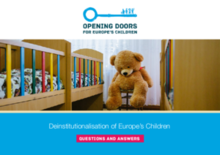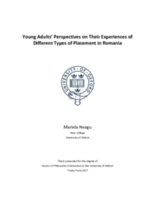Displaying 771 - 780 of 1510
In this video, Catholic Relief Services, Lumos, and Maestral International presented their project: Changing the Way We Care, a project aimed at ending the institutionalization of children.
This session of the World Travel Market in London focused on orphanage tourism and featured speakers from the Better Volunteering Better Care Initiative and other partners, including Save the Children, Friends International, Lumos, and People and Places.
This resource provides quick answers to some of the frequently asked questions about the transition from institutional to family- and community-based care for children, also known as deinstitutionalisation (DI).
In this video from Time for Global Action: Advancing the Sustainable Development Goals, Stephen Ucembe shares his experience of living in an orphanage and how institutionalization was detrimental to his development and wellbeing.
The aim of this study has been to assess the reasons for the increased enrolment of children into orphanages and child care centres. An action research was conducted in Islamabad and Rawalpindi between November and December 2017 to assess the situation and identify the causes and circumstance that bring in and compel orphans and vulnerable children to move out after a certain age or grade.
This research was conducted to study the relationships between academic performance, learning motivation, institutionalised environments and guardian involvement of children reared in a Malaysian orphanage.
This study explores the childhood experiences and transitions to adulthood of 39 Romanian care leavers and adoptees, born around 1989 - 1990.
The objective of this essay is to determine how substitute child care in the Czech Republic has changed in the last ten years.
Working collaboratively with two state associations and their member (nonprofit) agencies providing out-of-home care to children and youth, University researchers conducted a multi-site project to examine whether there were any differences in individual child-level outcomes between children placed in residential group care and those placed in foster.
Similarities and differences in the (short-term) psychosocial development of children in foster care, family-style group care, and residential care were investigated in a sample of 121 Dutch children one year after their initial placement.




